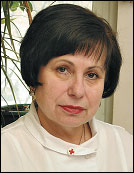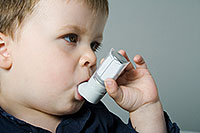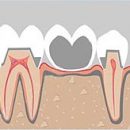Despite all the possibilities of modern preventive medicine, ARVI and flu are still poorly controlled infections and occupy a leading place in the structure of children's infectious pathology (70-95%). Special danger represent ARVI and flu in children under three years, t.To. At this age, the potential risk of severe complications and fatal outcome.
Content
Flu epidemics are accompanied by a significant increase in morbidity, cause serious damage to the health of the population and the economy of countries. According to experts, in recent years, the total economic damage from the incidence of influenza and ARVI in Russia is at least 40 billion rubles annually. With ORVI connected 30–50% of the loss of working time in adults and 60–80% of school classes in children. The most vulnerable «Risk groups» are often sick children who carry from 6 to 12 episodes of respiratory morbidity during the year. They account for 75% of all cases of ORVI.
The nature and severity of flu flowing in many ways depend on the age of the patient. In adults it is possible to develop a light form of the disease: a temperature of about 38°C, intoxication is weak or absent, rhinitis, pharyngitis. In children, the flu, as a rule, flows in medium-heavy and heavy shape, accompanied by body temperature up to 38.5–40°With already in the first hours of the disease. At the same time, other symptoms of varying degrees of severity appear:
- chills (muscular trembling, which is often taken for convulsions);
- headache;
- dizziness;
- vomit;
- pain in muscles, stomach, joints, eyeballs;
- Possible nasal bleeding and hemorrhage into subcutaneous fat tissue.
The less the age of the child is, the harder the disease and the higher the risk of developing complications. Fluity with influenza among children up to 6 months 3 times more than among children aged 1–2 years, t. To. Congenital immunity of infants is weakened, which leads to the insolvency of protective reactions.
In newborns, the flu may develop at normal temperatures with very scarce symptoms, so it can remain unnoticed. Inxication phenomena at this age are characterized by lethargy, refusal to food, drowsiness or vice versa — Anxiety, short-term dyspeptic disorders in the form of a liquid, sometimes watery chair. Among local symptoms there is a nasal congestion with scarce mucous discharge, which makes it difficult to suck.
However, in the absence of adequate antiviral treatment, such acute viral infections may complicate pneumonia, otitis, urinary tract infections against the background of a decrease in the immune status of the child. A number of drugs are used for the treatment of ARVI and influenza: antiviral, immunomodulatory, as well as anti-inflammatory (antipyretic) and symptomatic drugs. However, do not forget that the treatment of flu in children requires a particularly responsible approach to choosing pharmacological drugs. It is important here that the medicine is not only effective, but also as harmless to the children's body.
Among the antiviral drugs of etiotropic action should be noted Rimantadine. It has a double action: anti-virus and antitoxic. The anti-virus effect of rimantadine is implemented by blocking virus binding places with the surface of the cell membrane. At the same time, the drug oppresses the yield of virus particles from the cell. At the heart of the antitoxic action of Rimantadina lies its ability to prevent the development of capillaryotoxicosis.
It should be noted that not all preparations based on Rimantadina can be used in children. For the treatment of small patients, it is advisable to recommend the Rimantadina complex concluded in Alginatery (Orvimime). Sodium alginate is a low molecular weight modified polysaccharide, provides its best tolerability due to the slow and gradual release of the antibiotic. This pharmacological form of the drug provides the gradual admission of rimantadine into the blood prolonged circulation in the body, the constant concentration of the drug in the blood, a decrease in the toxic effect of the active substance. Thanks to these properties of Rimantadine in a sodium alginate complex in the drug Orvimime can be used for the prevention and treatment of influenza and ARVI in children aged 1.
Opinion of a specialist
 Mazankova Lyudmila Nikolaevna
Mazankova Lyudmila Nikolaevna
D.M.N., Professor,
head. Department of Children's Infectious Diseases of RMAPO Roszdrava.
Severity distinguish light, medium, heavy (toxic) and hypertoxic flu forms. The severity is determined by the degree of severity of general intoxication (hyperthermia, neurological symptoms: headache, dizziness, loss of consciousness, convulsions, meningeal symptoms, the severity of hemorrhagic syndrome, violations of cardiovascular activities, accompanied by circulatory disorders and lesions of the heart muscles). The flu in children can flow and in a hidden form. At the same time, the child remains almost healthy, but he has an increase in the titer of antibodies to the influenza virus. Such forms are detected only with laboratory examination of children.
Flu flow is always sharp. The duration of the fevering period — 3–5 days. Reduced body temperature usually critically. With a drop of temperature, the condition of children is improving. Repeated body temperature lifts are possible, however, they are usually due to the layering of the bacterial flora or other viral respiratory infection. Total disease duration — 7–10 days. After the transferred influenza for 2–3 weeks can persist phenomena of post-infectious asthenia: the child complains of increased fatigue, weakness, headache, irritability, insomnia.
The treatment of influenza and ARVI usually consists of several components:
- Elimination of the pathogen by using antiviral and antibacterial agents;
- prevention of immunological disorders and bacterial complications through the use of immunotropic drugs;
- Saving common and local symptoms of antipyretic and symptomatic means to reduce the duration of the disease.
Almost 75% of cases antibiotics are prescribed to patients. However, today active disputes are being conducted on the feasibility of using antibiotics with ORVI especially in children. It has been established that antibacterial therapy for viral infection does not affect the duration of the disease, the dynamics of the main clinical symptoms, the severity of post-inflationary syndrome, patient health. Antibiotics of synthetic origin against viruses are useless and not recommended. Indications for the purpose of systemic antibiotics are the attachment of the bacterial inflammatory process or the primary bacterial etiology of the ARZ.
The most effective treatment for viral infections is etiotropic. Its essence consists in the blockade of the penetration of the virus in a cage and (or) in the suppression of its replication. Ethiotropic therapy is advisable to start as soon as possible because it determines its maximum efficiency. In the treatment and prevention of complications of frequent respiratory morbidity in pediatrics, the antiviral and anti-inflammatory etiotropic means are attached great importance. The drugs of etiotropic influenza and ARVI and ARVI in children include derivatives of Rimantadine, neuraminidase inhibitors, monoclonal antibodies against respiratory syncytial virus.
Several words I would like to say about Rimantadine. Rimantadine in a complex with sodium alginate combines both direct antiviral and immunomodulatory effect. It contributes to the restoration of the cellular immunity: the drug induces interferon products of the second level of protection, which allows to strengthen the chemotherapeutic effect and prevent the development of the most severe influenza complications: laryngitis and pneumonia. Rimantadine in a complex with sodium alginate is allowed to use in children from 1 year. In the conditions of the epidemic of the flu, emergency prevention is needed. To do this, you can use Rimantadine in a complex with sodium alginate, which is both preventive, and therapeutic drug.
| Practical recommendations for the choice of antiviral drug for children Visitor in the pharmacy asks first-timer to recommend her drug for the treatment of influenza in a child.
Situation 1.
Situation 2.
Situation 3.
Situation 4.
Situation 5.
Situation 6. |
||









